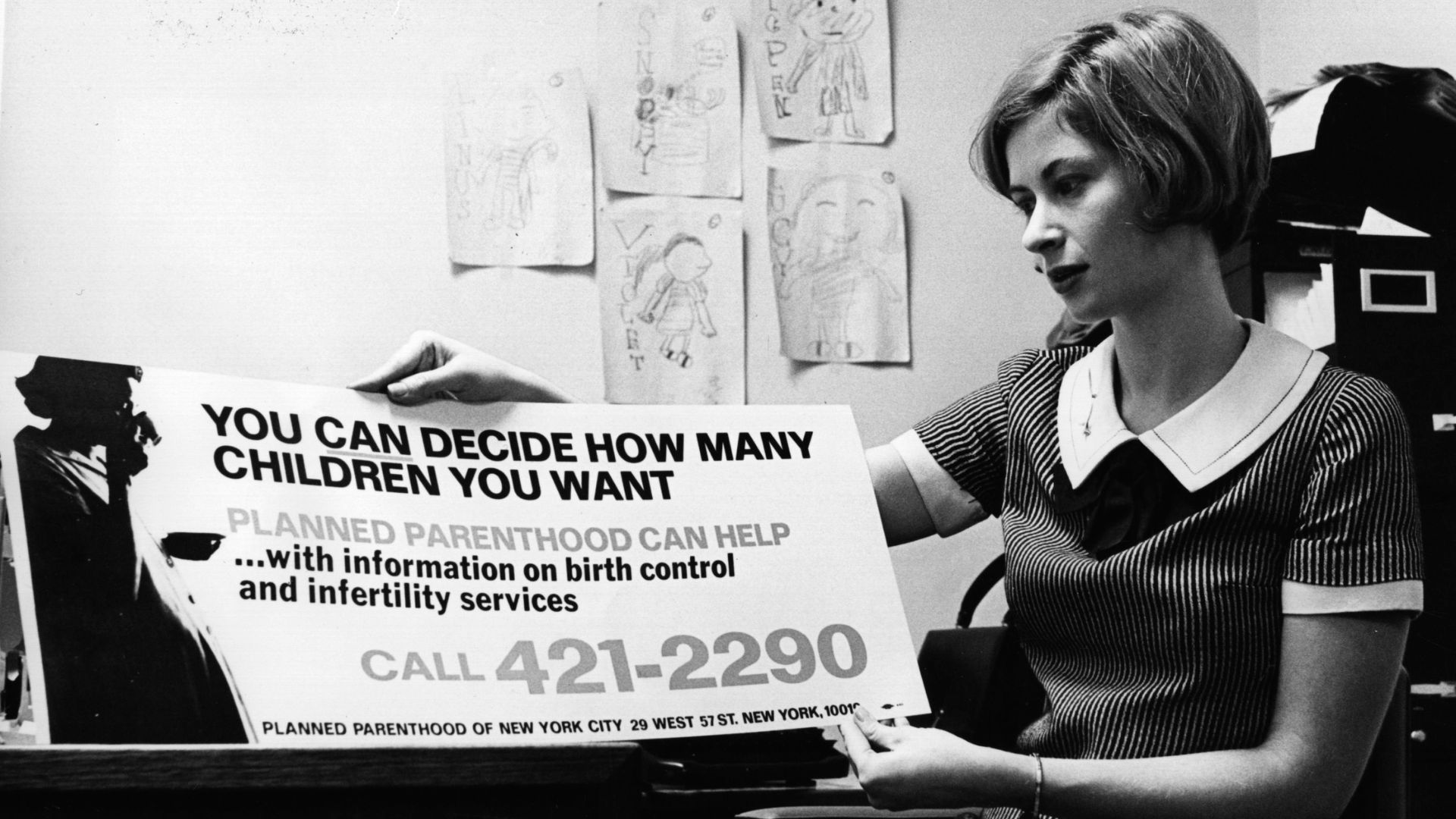What is sex positivity and why does it matter for women?
Sex positivity isn't just a philosophy, it's a movement, and educators, brands and women are embracing it


Grace Walsh
Sex positivity is a word you may have heard thrown around from time to time, probably more as an adjective someone uses to describe themselves and their attitude to sex. As the phrase might suggest, it's all about viewing sexual activity through a modern lens - one without the confines of religious shame or regressive attitudes.
Sex positivity is nothing explicitly new - with the sexual revolution of the 1960s creating the first wave - but we can't seem to stop talking about it. Many celebrities - including Lady Gaga, Jessica Biel, and Cameron Diaz - along with authors, comedians, activists, and influencers have openly championed the idea in the last few years. Most recently, fashion designer Diesel incorporated the idea into their AW23 show with a pile of 200,000 condoms to open the show.
But with all this attention on the concept, it's arguable that the true meaning of sex positivity has been lost in the noise. So what's it really about? Here, woman&home speaks to several sex-positive therapists, influencers, and coaches to understand what sex positivity means today and how we can harness the idea to learn how to have better sex ourselves.
What does sex positivity mean?
If someone describes themselves as sex-positive, it means they believe sex is healthy, normal, and natural, and not something to be ashamed of or embarrassed by. It's an attitude and an approach to sex that means "empowering individuals to have whatever sex life they want without judgment," says Lyndsey Murray, couples counselor and AASECT certified sex therapist. "This can mean a million different things depending on the person but there's no room for judgment or shame."
Sex positivity doesn't mean being 'up for anything' though and two sex-positive people may have entirely different approaches to sex. Consent plays a pivotal role in the movement, so as much as someone shouldn't be judged for having multiple partners or enjoying sex in a way others may see as unusual, someone shouldn't be judged for debating whether it's important to have sex in the first place.
The confusion between sex positivity and personal preference for sex is understandable though, says Kendra Capalbo, a licensed couples and sex therapist. "I think sometimes people confuse [the two]. I don't have to engage in a particular thing myself to be non-judgemental about it. Sex positivity is accepting that each person gets to dictate what they like and want in their relationships and celebrating that, even more specifically than the act itself."

The sex positivity movement
It'll come as no surprise to many people that the sex-positive movement started in the 1960s as part of the sexual revolution in the UK and the US. As historian David Allyn describes in his book, Make Love Not War, the movement was the result of a general "coming out" in society, which included revised ideas around premarital sex, sexuality in general, and masturbation, alongside changes in legislation that legalized homosexuality, abortion, and wider methods of contraception.
Sign up to our free daily email for the latest royal and entertainment news, interesting opinion, expert advice on styling and beauty trends, and no-nonsense guides to the health and wellness questions you want answered.
Today, the movement is being spearheaded in typical 2023 fashion: by brands, influencers, and educators. Sex brands that specialize in everything from the best rabbit vibrators to the best lubes have made their way onto beauty, wellbeing, fashion, and self-care platforms like Cult Beauty, Nasty Gal, and Sephora. You'll also see celebrities like Gwyneth Paltrow, Cara Delevingne, and Lily Allen designing and endorsing sex toys, flying the flag for sex positivity all the way. “I champion sexual positivity, significantly for women, and hope to change the cultural script that dictates a male vision of pleasure so all women can define their own sexual pleasures,” says Elizabeth Hart, an intimacy coach who also works with sexual wellness retailer, Apples and Pears Co. “As a business we champion sex positivity through a repetitive narrative, nothing is off-limits and women deserve pleasure."
A sex-positive brand doesn't have to be a sex shop, it can be anything from a clothing brand that champions female body positivity and sexuality, to a period care brand that shares empowering and educational messages about sex on your period or healthy expressions of sexuality between consenting adults. Some businesses don't share messages about sex positivity at all but do things like donating proceeds to organizations that protect and support women's reproductive rights, sex workers' rights, or women's health and domestic safety, for example.

14th December 1967: Birth Control information which is shortly to be displayed on New York buses is held up for scrutiny by Marcia Goldstein, the publicity director of 'Planned Parenthood'.
"For years we've been fed an idea that sexual pleasure occurs exclusively between heterosexual couples but sex is more than penetration. It is the totality of the encounter," Hart explains. "It's been common to linguistically erase a woman's most erotic organ by referring to our genitals as a ‘vagina’, which of course is the part that gives a man the most pleasure. Using the proper terminology, 'vulva', 'clitoris' and the like, rather than encouraging women and girls to use nicknames and incorrect anatomical descriptions reinforces the importance of female pleasure, and reduces any shame or taboo around the words and ideas."
Language is naturally a big part of the sex-positive movement. With some social networks, like Meta and TikTok, refusing to champion sex positivity. These platforms regularly ban sex education content, have removed advertisements for women's health products according to reporting from the New York Times, and ads that depict plus size and Black bodies. Instagram has also actively banned hashtags and keywords associated with sex and audio erotica.
“Sex-positive businesses are the future,” says Elle Gerami, chief marketing officer of adult social and content site sex.com. “These businesses focus on acceptance, inclusivity, and respect of the human condition and how this differs from person to person. As we’re approaching the first quarter of the 21st Century, there have been so many advancements in body positivity, mental health awareness, and celebrating the individuality of a person, yet many businesses have neglected conversations around sexuality. As a Middle Eastern woman, sex was a taboo topic in my upbringing.
"Due to the stigmatization of sex and female sexuality, I have witnessed those closest to me, with similar upbringings to mine, struggle with life-altering decisions, because topics of sex and sexuality were never nurtured and accommodated in a safe and open manner," she says. "In honor of those women, many women before me and for future generations, running a sex-positive business that and championing sex-positive education that celebrates female sexuality rather than hiding it and shaming women for being sexual is of the utmost importance for me and is a way to make my mark on the world.”
Businesses like sex.com work to make viewing sexual content a shame-free experience, but also work to support content creators in the sex industry, ensuring they are safe, fairly paid, and treated with respect online and in the real world. The best porn for women should always be ethical and entrepreneurs like Gerami work tirelessly to normalize respect and fair treatment of creators and consumers of sexual content. Thanks to the widespread popularity of sex-positive thinking, working in an ethical environment in which consent, female agency, and representation are paramount is non-negotiable for many performers, content creators, and adult workers today. Before sex positivity became a commonly-used term, many professional adult workers were accustomed to ensuring misconduct at work and were not aware they had a choice between unsafe working environments and those in which ethics were upheld.
Why is sex positivity so important for women?
Sex positivity is all about reclaiming pleasure, something that women have been taught is shameful and embarrassing, and just taught to ignore. Navigating past this as a society, Murray explains, "tells people that they don't need to hide who they are in order to be accepted and loved by other people."
It's something she sees a lot in her practice, where someone is forced to hide something about their sexuality in order to keep relationships with family, friends, and so on. "That's a really hard life to lead," she says. "Sex positivity removes that and says, 'No matter what [or who] you like, you are worthy of care and love', and we need more of that in this life."
And, in the long-run, a sex positive society could lead to a better environment for everyone. "Creating a culture of acceptance rather than shame leads to a healthier society as a whole," says Capalbo, who is also the founder of Esclusiva Couples Retreats. "So much of our lives are intertwined with our sexuality and eliminating judgment and fostering tolerance for differences will lead to people being the best version of themselves."

On a practical basis, embracing sex positivity can help women enjoy their sex lives fully - something else that we've historically missed out on. According to research by Chapman University, who reviewed the sex lives of over 52,500 people, the group most likely to always have an orgasm a heterosexual men at 95%. Only 65% of heterosexual women say they usually or always have an orgasm, which was the lowest of all demographics included.
But it's not even just a problem in partnered sex. Thanks to the taboos and shame put on women around masturbation, which doesn't exist in the same way for men, many women feel uncomfortable masturbating. This has led to a masturbation gap between men and women of 76% difference, according to sex toy brand Womanizer, despite this being a totally healthy and normal practice. Sex positivity aims to close these gaps, giving women the confidence to speak about what they want in the bedroom and platforming discussions to educate the population about these differences.
Is it possible to be sex negative?
Yes, it's entirely possible to be sex-negative. Although many people wouldn't describe themselves as such, as opposed to those who are sex-positive, being sex-negative is having any approach to sex and sexuality that defines it as negative or limits the scope of human enjoyment.
For example, perceiving sex and sexual thoughts, desires, and sexual behavior as immoral or dangerous. This could manifest as punishing or verbally criticizing someone for their attitude to sex, their sexual fantasies, or discriminating against them based on their sexuality. Other sex-negative behaviors include:
- violence and online abuse towards adult workers
- abuse of people who express their sexuality
- sex education that only teaches reproductive sex
- purity pacts and pressure to be abstinent
- slut-shaming and victim-blaming
It's not just individuals that can be sex-negative, however. In many cases, banned words on social media, the removal of comprehensive sex education in schools, and the limitation of sexual rights and freedoms by governments, medical boards, and policymakers are all examples of sex negativity.
What’s important to remember about sex positivity is that it represents the normalizing of sexuality, but also the idea that being sexual and talking about sex should be done as and where is appropriate. Being sex-positive doesn’t mean you should encourage conversations about sex at dinner with your in-laws or with minors outside of the classroom, for example, but in spaces and scenarios where healthy discourse about sex education and sexuality is appropriate.
Studies shows that such conversations pay off, for the health of everyone involved. For example, research by Planned Parenthood shows that comprehensive sex education reduces the rate of teen pregnancies, STI rates, and instances of sexual harassment and assault across many communities in the UK, Europe, and the US, so sex positivity is already having a profound impact in classrooms across the world.
How can we become more sex positive?
You don’t need a coach or a specific practice to be sex-positive. You can be sex-positive by learning how to be less judgemental of yourself and others, practicing sex positivity, and engaging in all sexual thoughts and experiences with an open mind and a positive approach. And you can champion it by speaking about the movement and its philosophy, supporting sex-positive businesses, educators, and sexual wellness apps, and sharing your sex-positive messages.
There are plenty of ways to embrace a more sex-positive lifestyle and champion a sex-positive philosophy. Sex-positive experts and educators recommend a mixture of education, practice, and advocacy, including:
- Explore your emotions: "Truly explore where feelings of shame and embarrassment stem from," suggests Capalbo. "This may be done alone, through journaling for example, or with the help of a sex-positive therapist."
- View sex-positive media: "Increase your exposure to sex-positive media and literature," she also recommends. "Educate yourself, especially about the things that bring you the most discomfort."
- Learn new behaviors: For example, Murray suggests, "Learn that you deserve pleasure just because you are a person who exists. Pleasure doesn't have to be earned."
- And how to pleasure yourself: "Make it a priority to deeply know your own body, especially how to pleasure yourself," says Simmons. "Not only will that give you the language and confidence to teach your partner/s, but the hormones released during solo sex are extraordinarily beneficial."
- Explore your own desires: "Practice communicating with your partner/s about your own sexual desires," says Capalbo. "And create a space for them to do the same, leading with curiosity rather than judgment if they share something that initially makes you uncomfortable."
Emilie Lavinia is a writer, entrepreneur and women’s wellbeing advocate. She is passionate about femtech, closing the gender health gap and campaigning for education and transparency across mental, physical and sexual health. Emilie presents All Being Well – a series that investigates the concept of wellness, good health according to experts and what it means to ‘be well’. She has a decade of experience as a journalist, editor and brand strategist and is the founder of four separate organisations that champion women’s health, marginalised communities and LGBTQ+ people.
- Grace WalshHealth Channel Editor
